Zhengbao Jiang
Beyond Memorization: The Challenge of Random Memory Access in Language Models
Mar 13, 2024



Abstract:Recent developments in Language Models (LMs) have shown their effectiveness in NLP tasks, particularly in knowledge-intensive tasks. However, the mechanisms underlying knowledge storage and memory access within their parameters remain elusive. In this paper, we investigate whether a generative LM (e.g., GPT-2) is able to access its memory sequentially or randomly. Through carefully-designed synthetic tasks, covering the scenarios of full recitation, selective recitation and grounded question answering, we reveal that LMs manage to sequentially access their memory while encountering challenges in randomly accessing memorized content. We find that techniques including recitation and permutation improve the random memory access capability of LMs. Furthermore, by applying this intervention to realistic scenarios of open-domain question answering, we validate that enhancing random access by recitation leads to notable improvements in question answering. The code to reproduce our experiments can be found at https://github.com/sail-sg/lm-random-memory-access.
Instruction-tuned Language Models are Better Knowledge Learners
Feb 20, 2024



Abstract:In order for large language model (LLM)-based assistants to effectively adapt to evolving information needs, it must be possible to update their factual knowledge through continued training on new data. The standard recipe for doing so involves continued pre-training on new documents followed by instruction-tuning on question-answer (QA) pairs. However, we find that LLMs trained with this recipe struggle to answer questions, even though the perplexity of documents is minimized. We found that QA pairs are generally straightforward, while documents are more complex, weaving many factual statements together in an intricate manner. Therefore, we hypothesize that it is beneficial to expose LLMs to QA pairs before continued pre-training on documents so that the process of encoding knowledge from complex documents takes into account how this knowledge is accessed through questions. Based on this, we propose pre-instruction-tuning (PIT), a method that instruction-tunes on questions prior to training on documents. This contrasts with standard instruction-tuning, which learns how to extract knowledge after training on documents. Extensive experiments and ablation studies demonstrate that PIT significantly enhances the ability of LLMs to absorb knowledge from new documents, outperforming standard instruction-tuning by 17.8%.
Learning to Filter Context for Retrieval-Augmented Generation
Nov 14, 2023Abstract:On-the-fly retrieval of relevant knowledge has proven an essential element of reliable systems for tasks such as open-domain question answering and fact verification. However, because retrieval systems are not perfect, generation models are required to generate outputs given partially or entirely irrelevant passages. This can cause over- or under-reliance on context, and result in problems in the generated output such as hallucinations. To alleviate these problems, we propose FILCO, a method that improves the quality of the context provided to the generator by (1) identifying useful context based on lexical and information-theoretic approaches, and (2) training context filtering models that can filter retrieved contexts at test time. We experiment on six knowledge-intensive tasks with FLAN-T5 and LLaMa2, and demonstrate that our method outperforms existing approaches on extractive question answering (QA), complex multi-hop and long-form QA, fact verification, and dialog generation tasks. FILCO effectively improves the quality of context, whether or not it supports the canonical output.
Active Retrieval Augmented Generation
May 11, 2023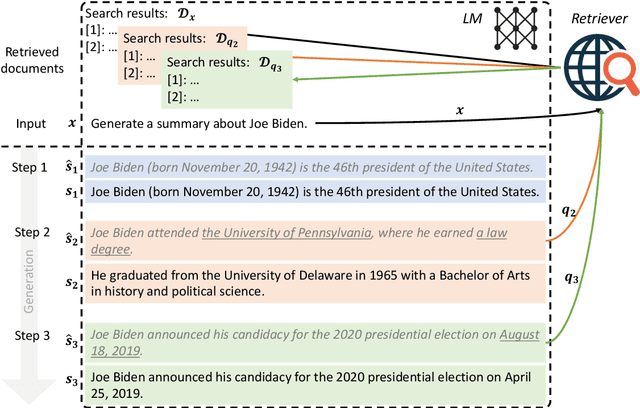

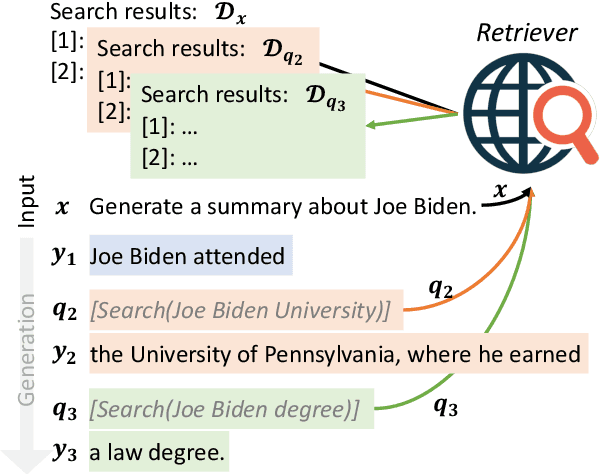

Abstract:Despite the remarkable ability of large language models (LMs) to comprehend and generate language, they have a tendency to hallucinate and create factually inaccurate output. Augmenting LMs by retrieving information from external knowledge resources is one promising solution. Most existing retrieval-augmented LMs employ a retrieve-and-generate setup that only retrieves information once based on the input. This is limiting, however, in more general scenarios involving generation of long texts, where continually gathering information throughout the generation process is essential. There have been some past efforts to retrieve information multiple times while generating outputs, which mostly retrieve documents at fixed intervals using the previous context as queries. In this work, we provide a generalized view of active retrieval augmented generation, methods that actively decide when and what to retrieve across the course of the generation. We propose Forward-Looking Active REtrieval augmented generation (FLARE), a generic retrieval-augmented generation method which iteratively uses a prediction of the upcoming sentence to anticipate future content, which is then utilized as a query to retrieve relevant documents to regenerate the sentence if it contains low-confidence tokens. We test FLARE along with baselines comprehensively over 4 long-form knowledge-intensive generation tasks/datasets. FLARE achieves superior or competitive performance on all tasks, demonstrating the effectiveness of our method. Code and datasets are available at https://github.com/jzbjyb/FLARE.
From Zero to Hero: Examining the Power of Symbolic Tasks in Instruction Tuning
Apr 17, 2023Abstract:Fine-tuning language models on tasks with instructions has demonstrated potential in facilitating zero-shot generalization to unseen tasks. In this paper, we introduce a straightforward yet effective method for enhancing instruction tuning by employing symbolic tasks. Compared to crowdsourced human tasks or model-generated tasks, symbolic tasks present a unique advantage as they can be easily generated in vast quantities, theoretically providing an infinite supply of high-quality training instances. To explore the potential of symbolic tasks, we carry out an extensive case study on the representative symbolic task of SQL execution. Empirical results on various benchmarks validate that the integration of SQL execution leads to significant improvements in zero-shot scenarios, particularly in table reasoning. Notably, our 3B model surpasses both the 175B GPT-3 and ChatGPT in zero-shot table reasoning across four benchmarks. Furthermore, experimental results on BBH (27 tasks) and MMLU (57 tasks) reveal that language models can be enhanced through symbolic tasks without compromising their generality. We hope that our paper serves as a catalyst, inspiring increased efforts to incorporate symbolic tasks in instruction tuning.
GPTScore: Evaluate as You Desire
Feb 13, 2023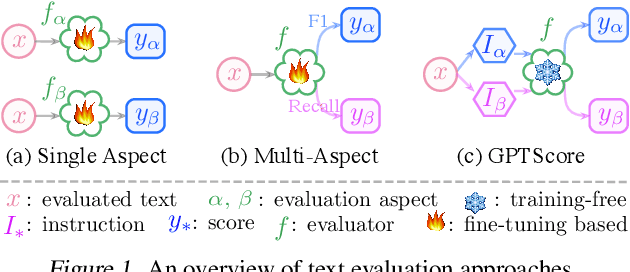
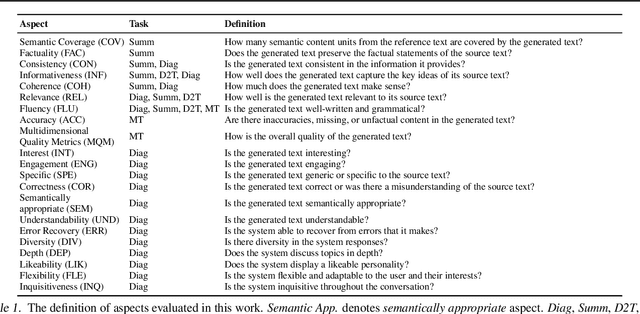

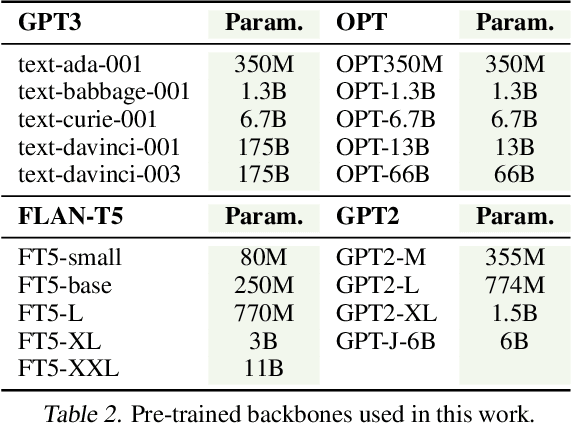
Abstract:Generative Artificial Intelligence (AI) has enabled the development of sophisticated models that are capable of producing high-caliber text, images, and other outputs through the utilization of large pre-trained models. Nevertheless, assessing the quality of the generation is an even more arduous task than the generation itself, and this issue has not been given adequate consideration recently. This paper proposes a novel evaluation framework, GPTScore, which utilizes the emergent abilities (e.g., zero-shot instruction) of generative pre-trained models to score generated texts. There are 19 pre-trained models explored in this paper, ranging in size from 80M (e.g., FLAN-T5-small) to 175B (e.g., GPT3). Experimental results on four text generation tasks, 22 evaluation aspects, and corresponding 37 datasets demonstrate that this approach can effectively allow us to achieve what one desires to evaluate for texts simply by natural language instructions. This nature helps us overcome several long-standing challenges in text evaluation--how to achieve customized, multi-faceted evaluation without the need for annotated samples. We make our code publicly available at https://github.com/jinlanfu/GPTScore.
Retrieval as Attention: End-to-end Learning of Retrieval and Reading within a Single Transformer
Dec 05, 2022



Abstract:Systems for knowledge-intensive tasks such as open-domain question answering (QA) usually consist of two stages: efficient retrieval of relevant documents from a large corpus and detailed reading of the selected documents to generate answers. Retrievers and readers are usually modeled separately, which necessitates a cumbersome implementation and is hard to train and adapt in an end-to-end fashion. In this paper, we revisit this design and eschew the separate architecture and training in favor of a single Transformer that performs Retrieval as Attention (ReAtt), and end-to-end training solely based on supervision from the end QA task. We demonstrate for the first time that a single model trained end-to-end can achieve both competitive retrieval and QA performance, matching or slightly outperforming state-of-the-art separately trained retrievers and readers. Moreover, end-to-end adaptation significantly boosts its performance on out-of-domain datasets in both supervised and unsupervised settings, making our model a simple and adaptable solution for knowledge-intensive tasks. Code and models are available at https://github.com/jzbjyb/ReAtt.
SPE: Symmetrical Prompt Enhancement for Fact Probing
Nov 14, 2022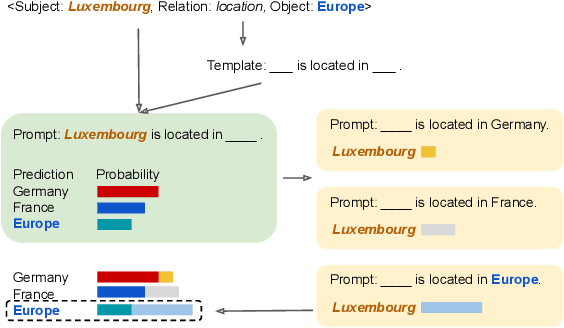

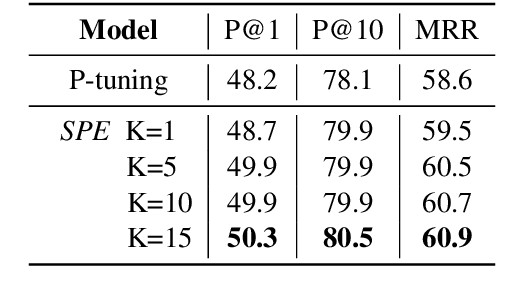
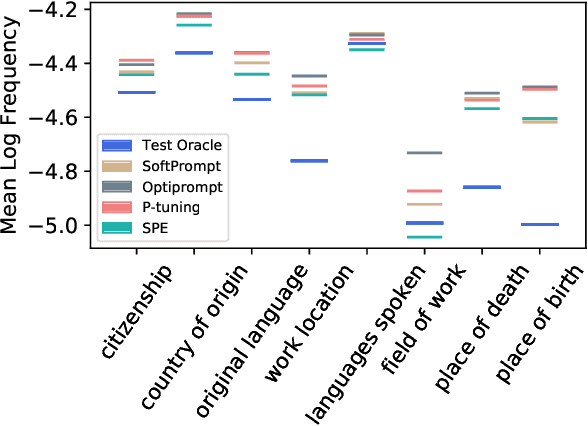
Abstract:Pretrained language models (PLMs) have been shown to accumulate factual knowledge during pretrainingng (Petroni et al., 2019). Recent works probe PLMs for the extent of this knowledge through prompts either in discrete or continuous forms. However, these methods do not consider symmetry of the task: object prediction and subject prediction. In this work, we propose Symmetrical Prompt Enhancement (SPE), a continuous prompt-based method for factual probing in PLMs that leverages the symmetry of the task by constructing symmetrical prompts for subject and object prediction. Our results on a popular factual probing dataset, LAMA, show significant improvement of SPE over previous probing methods.
Understanding and Improving Zero-shot Multi-hop Reasoning in Generative Question Answering
Oct 09, 2022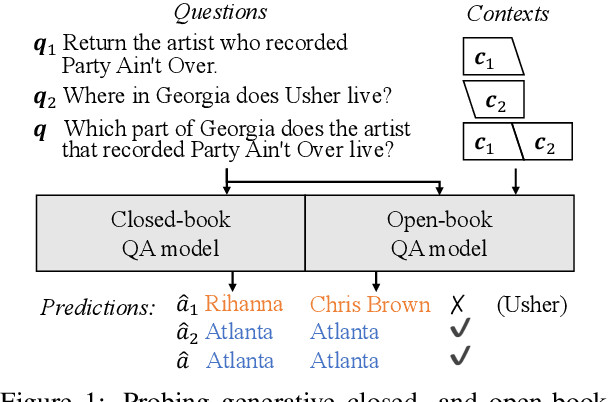
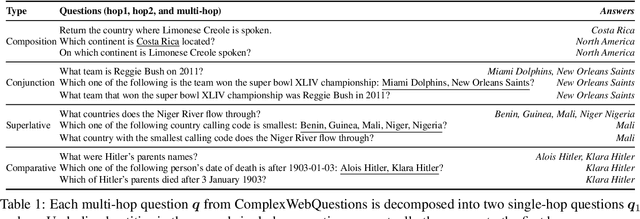
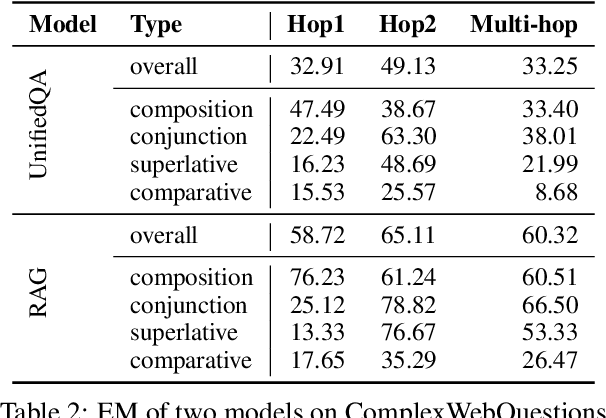

Abstract:Generative question answering (QA) models generate answers to questions either solely based on the parameters of the model (the closed-book setting) or additionally retrieving relevant evidence (the open-book setting). Generative QA models can answer some relatively complex questions, but the mechanism through which they do so is still poorly understood. We perform several studies aimed at better understanding the multi-hop reasoning capabilities of generative QA models. First, we decompose multi-hop questions into multiple corresponding single-hop questions, and find marked inconsistency in QA models' answers on these pairs of ostensibly identical question chains. Second, we find that models lack zero-shot multi-hop reasoning ability: when trained only on single-hop questions, models generalize poorly to multi-hop questions. Finally, we demonstrate that it is possible to improve models' zero-shot multi-hop reasoning capacity through two methods that approximate real multi-hop natural language (NL) questions by training on either concatenation of single-hop questions or logical forms (SPARQL). In sum, these results demonstrate that multi-hop reasoning does not emerge naturally in generative QA models, but can be encouraged by advances in training or modeling techniques.
EditEval: An Instruction-Based Benchmark for Text Improvements
Sep 27, 2022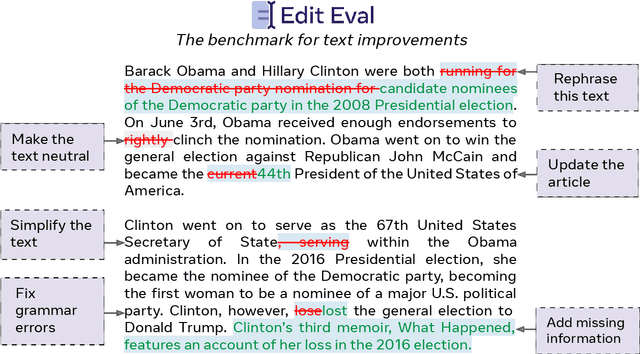
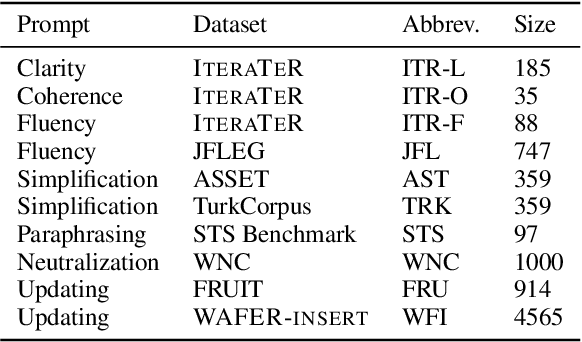
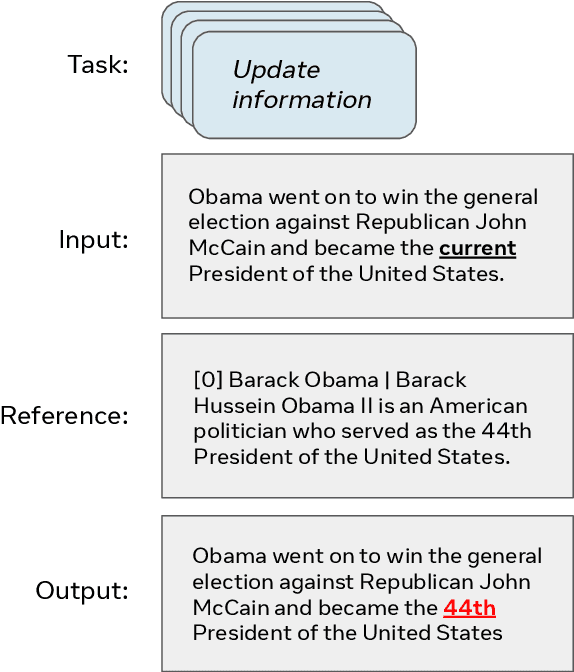
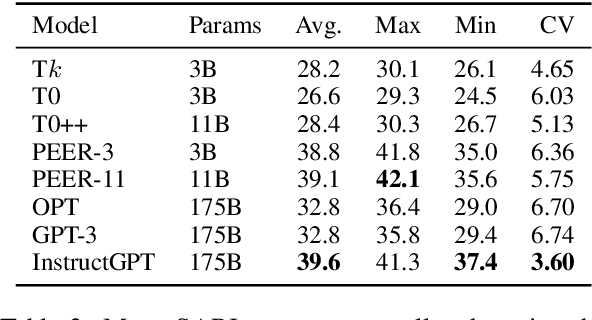
Abstract:Evaluation of text generation to date has primarily focused on content created sequentially, rather than improvements on a piece of text. Writing, however, is naturally an iterative and incremental process that requires expertise in different modular skills such as fixing outdated information or making the style more consistent. Even so, comprehensive evaluation of a model's capacity to perform these skills and the ability to edit remains sparse. This work presents EditEval: An instruction-based, benchmark and evaluation suite that leverages high-quality existing and new datasets for automatic evaluation of editing capabilities such as making text more cohesive and paraphrasing. We evaluate several pre-trained models, which shows that InstructGPT and PEER perform the best, but that most baselines fall below the supervised SOTA, particularly when neutralizing and updating information. Our analysis also shows that commonly used metrics for editing tasks do not always correlate well, and that optimization for prompts with the highest performance does not necessarily entail the strongest robustness to different models. Through the release of this benchmark and a publicly available leaderboard challenge, we hope to unlock future research in developing models capable of iterative and more controllable editing.
 Add to Chrome
Add to Chrome Add to Firefox
Add to Firefox Add to Edge
Add to Edge